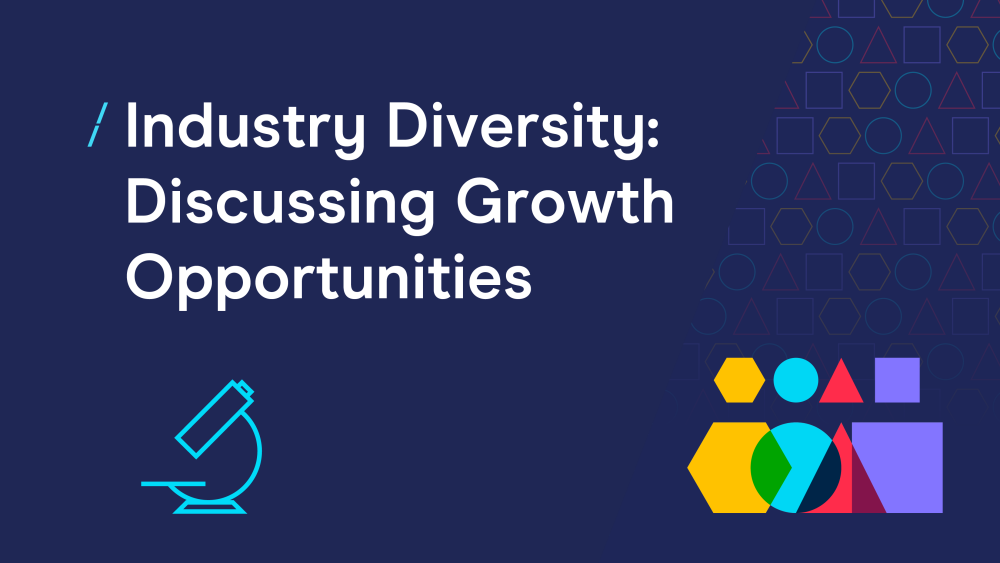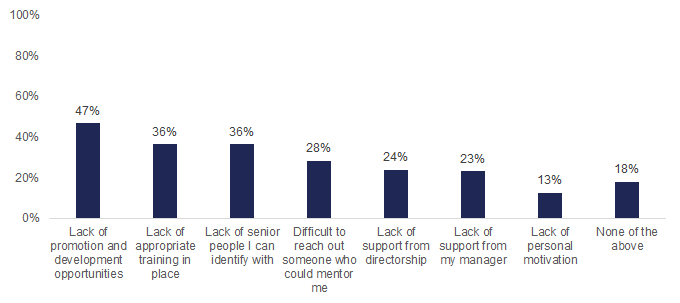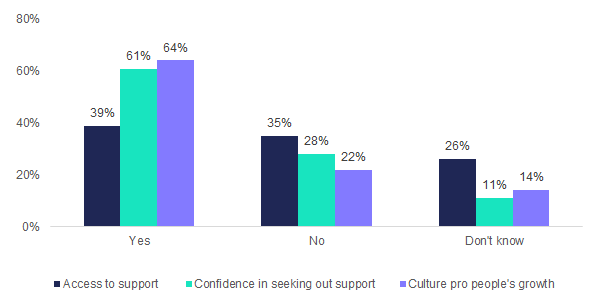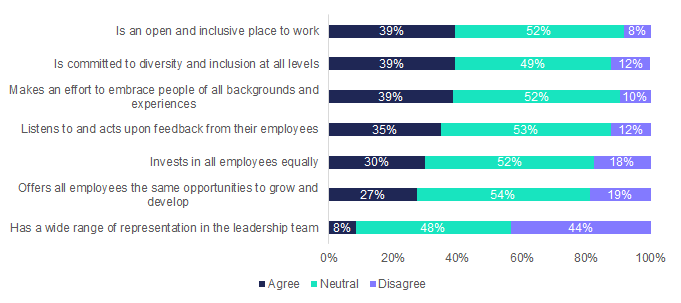Industry Diversity: Discussing Growth Opportunities
20 Jun 2021

Simple metrics, like quotas, aren’t enough to achieve real diversity in the workplace. Last year we wrote a series of articles to provide insight into what diversity looks like in today’s data and marketing industry – including Background and Education, Disability and Health, Ethnicity and Race and Gender and Sexuality.
In 2020, the DMA and Culture Heroes also conducted an industrywide survey aimed at understanding how to develop and implement strategies to encourage more inclusive work environments and, ultimately, improve both retention and progression of talent within organisations.
In this article, we will discuss the main findings and insights from the data.
We will start with an overview of what the opportunities are for respondents to step into a leadership role in their future career, as well as the barriers they feel are hindering such progression.
Consecutively, we will discuss the state of support – meaning the opportunities respondents can access inside their organisations.
Finally, we will investigate how companies are addressing themes related to diversity and inclusion.
Interest in leadership roles
In 2020 nine out of 10 respondents said they would be keen to step into a leadership position.
Interest in covering a leadership role within the current organisation

However, despite the majority showing active interest in their professional growth, more than a third (36%) don’t think their current organisation is the right place to take such a step. A slight improvement compared to 2019, when almost half of respondents (46%) said they couldn’t see themselves growing within their business.
In terms of timeframe, most respondents (77%) see themselves reaching the next step in their career ladder in about 2 years.
Barriers to professional growth
The majority of the respondents (59%) showed their concerns about the lack of support within their company – whether that should come from the board (24%), their immediate manager (23%) or simply someone who could advise them on what they should do in order to succeed in their career progression (28%).
Respondents’ businesses show a lack of career promotion and development opportunities for those who are keen to progress (48%). Furthermore, respondents seem to be sceptical about the fairness of their companies (79%), with female employees in particular (87%) feeling their organisation does not have an open and fair approach to promotions within the business.
Barriers hindering carrer progression

Four in 10 mentioned the lack of an appropriate training programme in place that would allow them to grow – whether that’s a course or having access to a mentorship scheme. In particular, employees aged between 25 and 34 years old (58%) have been more hindered by this hurdle.
The data highlights how employees believe their inability to grow within their role is due to several external factors, above and beyond any possible lack of personal motivation (13%).
Access to Internal Support
64% of the respondents said their organisation’s culture support people’s growth, one in four (22%) believes the opposite and 14% simply don’t know. Furthermore, about two thirds (61%) of the respondents said they feel confident enough to seek support within their organisation but there is still 28% who don’t feel ready to ask for such assistance.
The research found a fair split between the percentage of those who think they have access to opportunities to successfully develop within their company (39%), those who don’t (35%) and those who aren’t sure (26%).
In particular, employees from ethnic minorities (78%) feel they haven't got access to the necessary support to develop their career as well as employees aged 25-34 years old.
Access to Support - A 360⁰ Perspective

In other words, despite the majority feeling they belong to a supportive culture and being confident in asking for support to develop their career, a big slice of respondents seem to be under the impression they haven’t got access to what they need to become a leader. This data confirmed what was mentioned in the earlier section, with a third of respondents (36%) not believing their current organisation isn't the right place for them to grow and become a leader.
Furthermore, only a third of respondents believe that their organisation gives them fair opportunities for training (34%), makes them feel empowered to take the next step in their professional development (34%) or encourages their professional growth and development (33%).
Feeling unrepresented
39% of the respondents agree that their companies are open and inclusive, committed to diversity and inclusion at all levels and make an effort to include people from different background and experiences.
Diversity and inclusion

However, when it comes to transforming this approach into real actions, respondents are more hesitant about the inclusivity of their organisations. Indeed, only one in four thinks that their company offers the same development opportunities and, worse, less than one in 10 feels there is a wide range of representation in their leadership team.
As a matter of fact, more than half (55%) of the respondents don’t feel represented by their leadership group with BAME (70%) and women (65%) employees feeling especially unrepresented by their organisations’ board.
As Kate Burnett, General Manager of DMA Talent, explains "a diverse, skilled workforce can build better business outcomes through innovation, collaboration, loyalty, and a strong sense of community. To this end, diversity and inclusion are essential to the DMA’s drive to attract the most gifted minds and fresh thinkers into the data and marketing industry".
Visit our Diversity and Inclusion page for more insight, ideas and what the DMA is doing to make our industry more inclusive.